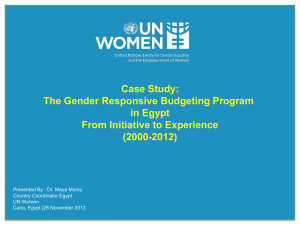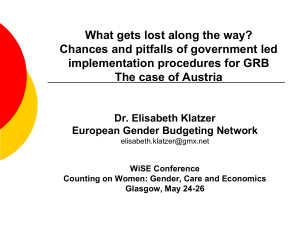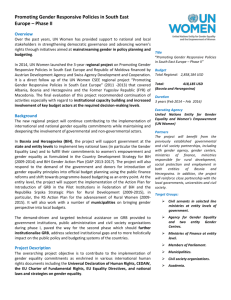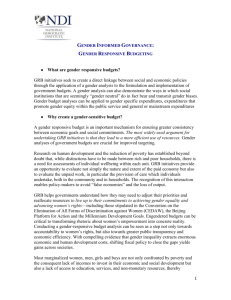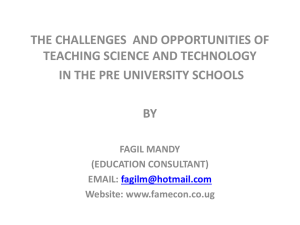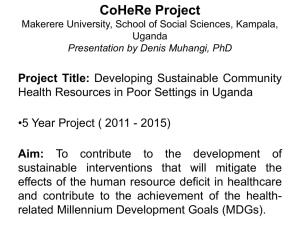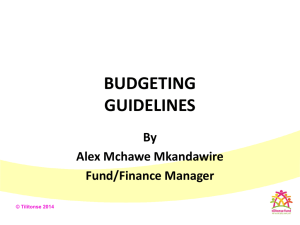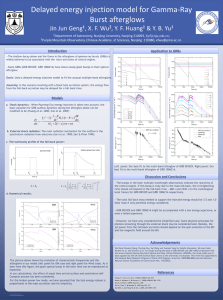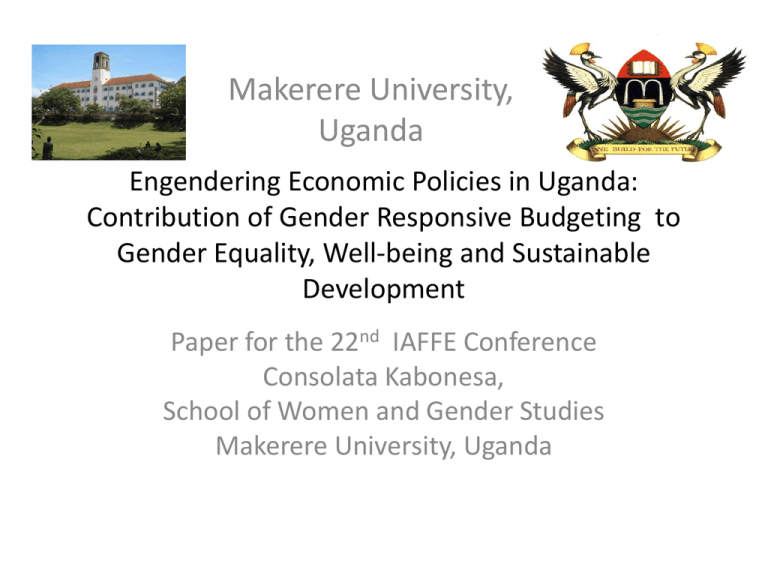
Makerere University,
Uganda
Engendering Economic Policies in Uganda:
Contribution of Gender Responsive Budgeting to
Gender Equality, Well-being and Sustainable
Development
Paper for the 22nd IAFFE Conference
Consolata Kabonesa,
School of Women and Gender Studies
Makerere University, Uganda
We hear budgeting but we
do not know what they do!
Female FGD, Kabarole
Introduction
• Gender equality and women’s empowerment
as key to national development
• Global perspective – gender inequalities are
– within social, economic and political systems
– Institutions
• Systems and institutions hinder national
development and individual development
• Women’s well being is highly constrained
• In Uganda the situation is no different
Basis for Gender quality, Wellbeing
and Sustainable Development
• International , regional and national
instruments address gender inequality
– CEDAW, Beijing Platform for Action, Millennium
Development Goals, The Republic of Uganda
Constitution, The National Development Plan. The
National Gender Policy, The National Action Plan
on Women, The Health Policy and Health Strategy,
etc.
Basis for Gender quality, Wellbeing
and Sustainable Development
• Despite the numerous approaches and
instruments to addressing gender inequalities
globally, the gap in economic and social wellbeing between men and women in Uganda
has continued to grow
• Women more than men are infected by HIV –
power relations, limited decision making in
the household, limited financing for gender
responsive service delivery programmes, etc.
Introduction
• Over all aim of the study whether and in which
ways the implementation of GRB has contributed
to promoting gender equality, well-being and
sustainable economic development in Uganda.
– Who gets involved, nature of involvement, response
to involvement – if suggestions are made are they
taken on? If funds are remitted are they used to
address their suggestions? Etc.
– Trends in socio-economic indicators of both males
and females.
Gender Mainstreaming and Gender
Responsive Budgeting
• Gender mainstreaming - means of addressing
gender inequalities and promoting human
development
• Through inclusion and participation in policy
making and implementation, budget processes
and social-economic related programmes.
• Gender Responsive Budgeting (GRB) - a strategy
of engendering financial and economic policies
for increased national growth, gender equality
and women’s empowerment
Gender Responsive Budgeting
• Where Does Uganda stand in the area of GRB
particularly in Health – HIV/AIDS?
• In Uganda GRB started in 1997 –
• Civil Society Organizations (CSOs) - Forum for
Women in Democracy (FOWODE) and
Parliamentary Women’s Caucus, etc.
• These organizations operate both at the
national and district level
• 2004 Government’s call for engendering
budgets – gender and equity bugdeting
Some questions
• What then is happening in the various
sectors?
• How are the resources distributed and
shared?
• Where majority of women employed?
• Does it pay?
• How do the sectors contribute to GDP?
Percentage Employment by Industry and Sex
90
80
70
60
50
40
30
20
10
0
Sex Female
Sex male
Sector Composition of GDP(%)
2005/6 – 2010/11
100
90
80
70
49.6
49.5
49.9
50.7
51.6
52.4
60
Services
50
Industry
Agriculture
40
30
24.8
25.1
25.1
24.8
25
25.3
18.3
16.9
15.8
15.1
14.7
13.9
2005/06
2006/07
2007/08
2008/09
2009/10
2010/11
20
10
0
Sector Contribution to GDP at basic prices
50
45
40
35
30
2003/2004
2004/2
25
2005/6
20
2006/7
15
10
5
0
Agriculture
Industry
Services
Service Sector
Composition of Service Sector in 2010/2011
30
25
20
15
10
5
0
Composition of service sector
in 2010/2011 Percentages
Some well Being Indicators
• Poverty –
– 24.5 percent (7.5 million people) of the
population were below the poverty line
– Compared to 56 percent in 1992, 38 percent (9.8
million people) in 2002/03, and 31 percent (8.4
million people) in 2005/06.
• 2009/10 Uganda National Household Survey (UNHS)
HDI and GDI
2003 2004 2005 20062007/ 2009 2010 2011
08
HDI 0.489 0.493 0.508 0.502 0.505 0.449 0.422 0.446
GDI 0.483 --
0.502 0.498 0.502 0.509
--
0.577
Education
• Primary enrolment FY2009/10 - 8.7 million in
while the literacy rate of the population aged
10 years and above increased from 69% in
2005/06 to 73% in 2009/10.
• Completion rate still low
• Female drop out rates still high due to social –
cultural and institutional factors
Some specific indicators
•
•
•
•
Education
Health
Success Stories in GRB
Challenges in GRB
Health
• Improved access to water - 63% (2002/3)
68.0% (2005/6) 73.8% (2009/10)
• Maternal Mortality 435 per 100,000 and
• Infant mortality 76 per 1,000 (2009/10)
• Cases of preventable diseases
• Increased HIV infection rates
Successful Stories
• GRB meant one should incorporate the
disabled and women issues. During the
budget making process women groups are
requested to bring their proposals ……… they
budget for women and disabled projects
through their groups. Groups identify their
projects which are funded by the sub county.
Bubare Sub-county Chief
Kabale District
Organisational Participation in
Budgeting
• NGOs - participate in the district budget
conference through availing its budget to the
district officials
• NGOs identify the activities of interest
• NGOs help the district in providing advisory
services as in regards to the budget draft.
• REPRODUCTIVE HEALTH UGANDA-KABALE
Challenges
• We are invited to participate in the budget
conferences, but in most cases we find the
budget already made. So our participation
doesn’t yield much. Budget is made just to fit
in the indicative figures of finances as prior
determined in the ministry of finance and
planning• KRC-KABAROLE
Challenges
– At the district level it is still limited and has
challenges Kabale district planner noted:
– Varied interests of politicians such activities may
not necessarily regard gender and women’s
needs. ----- Kabale district Planner
• We hear budgeting but we do not know what
they do! Female FGD, Kabarole
• Misrepresentation of gender leading to
misconceptions of gender equality and
women’s empowerment
What can be done?
• Awareness creation, engaging policy makers
and other decision makers.
- Develop capacity for gender budgeting and equity
- Information for communities on GRB
• Make governments accountable on Policy
commitments
• Increase public investments in health, water
and sanitation, education, and agriculture.
Acknowledgement
• Three Year Research Grant from the Austrian
Development Cooperation
• Our Collaborators from the Vienna University
of Economics and Business, Institute for
Institutional and Heterodox Economics
• Research Teams from Makerere University and
Kyambogo University.
Thank you



